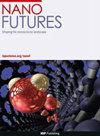纳米生物混合物和细菌载体:癌症靶向治疗的新途径
IF 3.3
4区 材料科学
Q3 MATERIALS SCIENCE, MULTIDISCIPLINARY
引用次数: 0
摘要
纳米技术和生物技术在这方面的新策略为癌症治疗提供了新的高效模式。在本研究中,我们探讨了纳米生物混合物,这是一种以细菌为靶标的癌症治疗方法,是治疗癌症的新型治疗载体。我们特别关注细菌仿生学,即利用细菌作为治疗剂的天然载体。这些细菌具有在肿瘤组织周围定位的路径定向能力,即使是通常对标准疗法无效的缺氧区域也不例外。通过对这些细菌的表面进行工程设计,我们可以增强它们靶向肿瘤细胞的能力,从而将治疗药物特异性地输送到肿瘤微环境中,而且不会产生或极少产生全身副作用。此外,这些灌输到细菌系统中的合成纳米粒子还能稳定药物,并提供一种控制释放的方法,这对保持治疗效果非常重要。我们的研究结果表明,从个性化癌症治疗的角度来看,这种纳米生物混合物能够高效地输送化疗药物,并产生局部实时治疗反应。这项研究意味着癌症靶向治疗的巨大发展,进一步的工作重点是优化这些生物杂交系统的临床应用。本文章由计算机程序翻译,如有差异,请以英文原文为准。
Nanobiohybrids and bacterial carriers: a novel pathway to targeted cancer therapy
The new strategies in this regard of nanotechnology and biotechnology guarantee new, efficient modalities for cancer therapy. In this study, we explore nanobiohybrids, the bacterium-targeted cancer treatment approach that presents a new category of therapeutic carriers for treating cancer. We specifically focus on bacteriomimetics, where bacteria are used as natural carriers for therapeutic agents. These bacteria possess the ability of pathotropism in localizing themselves around tumor tissues, even hypoxic areas that are generally refractory to standard therapies. By engineering the surface of these bacteria, we enhance how they target tumor cells so that treatment is delivered specifically to the tumor microenvironment with no or minimal systemic side effects. Furthermore, these synthetic nanoparticles inculcated into these bacterial systems stabilize drugs and also provide a way for controlled release, which is important to maintain therapeutic effectiveness. Our results established that such nanobiohybrids are capable of efficient delivery of chemotherapeutic agents and of conducting a local real-time therapeutic response from the perspective of personalized cancer treatment. This research implies a huge development in targeted therapy against cancer, and further work has focused on optimizing these biohybrid systems for clinical applications.
求助全文
通过发布文献求助,成功后即可免费获取论文全文。
去求助
来源期刊

Nano Futures
Chemistry-General Chemistry
CiteScore
4.30
自引率
0.00%
发文量
35
期刊介绍:
Nano Futures mission is to reflect the diverse and multidisciplinary field of nanoscience and nanotechnology that now brings together researchers from across physics, chemistry, biomedicine, materials science, engineering and industry.
 求助内容:
求助内容: 应助结果提醒方式:
应助结果提醒方式:


